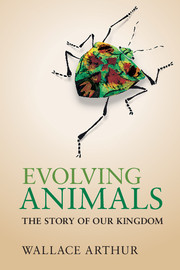Book contents
- Frontmatter
- Dedication
- Contents
- Preface
- Acknowledgements
- 1 What is an animal?
- 2 Before there were animals
- 3 How to make a fossil
- 4 The Cambrian explosion
- 5 How to make a species
- 6 Jellyfish and their kin
- 7 How to make a tree
- 8 The enigmatic urbilaterian
- 9 Animal symmetry and heads
- 10 A plethora of worms
- 11 Trends in animal complexity
- 12 Where the octopus is king
- 13 How to make an animal
- 14 Exoskeletons galore
- 15 Extinction
- 16 Mouth first, mouth second
- 17 Comparing embryos
- 18 Larvae, mouthparts and moulting
- 19 The animal toolkit
- 20 Vertebrate origins and evolution
- 21 From water to land to water
- 22 Variation and inheritance
- 23 Evolutionary novelties
- 24 Human origins and evolution
- 25 Animal plasticity
- 26 The nature of adaptation
- 27 The direction of evolution
- 28 Animal extremophiles
- 29 Extraterrestrial animals?
- 30 The ghost in the machine
- Appendix
- References
- Index
17 - Comparing embryos
Published online by Cambridge University Press: 05 August 2014
- Frontmatter
- Dedication
- Contents
- Preface
- Acknowledgements
- 1 What is an animal?
- 2 Before there were animals
- 3 How to make a fossil
- 4 The Cambrian explosion
- 5 How to make a species
- 6 Jellyfish and their kin
- 7 How to make a tree
- 8 The enigmatic urbilaterian
- 9 Animal symmetry and heads
- 10 A plethora of worms
- 11 Trends in animal complexity
- 12 Where the octopus is king
- 13 How to make an animal
- 14 Exoskeletons galore
- 15 Extinction
- 16 Mouth first, mouth second
- 17 Comparing embryos
- 18 Larvae, mouthparts and moulting
- 19 The animal toolkit
- 20 Vertebrate origins and evolution
- 21 From water to land to water
- 22 Variation and inheritance
- 23 Evolutionary novelties
- 24 Human origins and evolution
- 25 Animal plasticity
- 26 The nature of adaptation
- 27 The direction of evolution
- 28 Animal extremophiles
- 29 Extraterrestrial animals?
- 30 The ghost in the machine
- Appendix
- References
- Index
Summary
When first examining animal development in Chapter 13, we noted that a pioneer of the subject of embryology was the Italian Hieronymus Fabricius, whose studies on the development of the chick were published posthumously in 1621. This work can best be considered as descriptive embryology – it involved a focus on a particular animal and gave as detailed a description of its embryogenesis as the techniques of the time would allow.
It was not until about two centuries later that embryology became truly comparative. This aspect of embryology is clearly related to evolution, as was recognized by Darwin, who, in 1859, devoted part of chapter 13 in On the Origin of Species to their relationship. An often-quoted statement that Darwin makes there is: “community in embryonic structure reveals community of descent.” We might do well to examine this statement carefully, to try to come up with a modern version of it, and to see what course of logic such an attempt will set in train.
Information
- Type
- Chapter
- Information
- Evolving AnimalsThe Story of our Kingdom, pp. 166 - 176Publisher: Cambridge University PressPrint publication year: 2014
